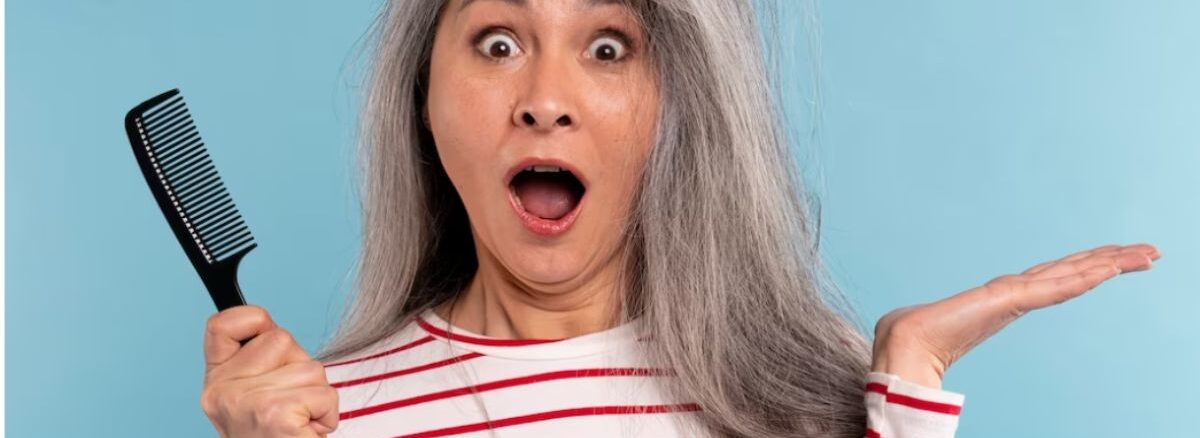Have you ever glanced in the mirror, only to be startled by the unexpected presence of silver strands among your once-youthful locks? If you have, you’re far from alone. Premature greying of hair is a widespread concern that transcends age and gender. It’s a topic that has piqued the curiosity of many, as we strive to comprehend the factors contributing to this natural transformation. In this blog, Dr. Jastinder Gill, the best dermatologist and hair specialist in Ludhiana, embarked on a journey to unravel the mysteries behind premature greying of hair, exploring its causes and potential remedies. So, let’s dive into the details of hair pigment and discover ways to embrace the beauty of silver.
Premature Greying of Hair
As we grow older, there are a number of changes going on inside our body, including skin and hair. A very obvious change seen is the greying and thinning of hair.
The black colour of the hair is due to the melanin pigment (it’s the same melanin present in the skin) present in the hair follicles. The cells that produce the pigment start to decline as we get older, and gradually there is a decrease in the melanin, leading to greying of hair and then loss of total melanin, which makes the hair white in colour.
Sometimes early or premature greying of hair is observed in children and teenagers. The reason behind premature greying of hair is stress, hormonal dysfunction (like thyroid), and vitamin and nutritional deficiencies. There’s also a genetic predisposition, as seen in members of the same family. The commonly observed nutritional deficiencies leading to premature greying are iron and B complex, especially vitamin B12 and folate. Stress plays a crucial role, causing oxidative stress and damage, leading to loss of pigment.
What Causes Greying of Hair?
- Genetics – Genetics plays a major role in the manifestation of premature greying of hair, there is a family history of the same in the close family members.
- Nutritional Deficiencies – There is a strong possibility of multivitamin deficiencies, The following deficiencies are very commonly seen, iron and B complex and out of the B complex, the more commonly associated are vitamin B12 and Folic acid. Low vitamin D levels are also associated
- Autoimmune – Premature greying of hair is often seen in people who have other autoimmune disorders, say thyroid and diabetes,
- Stress – As with all major health issues, stress is the biggest contributor to premature greying of hair.
Can you reverse the greying of hair?
The natural process of greying cannot be reversed, but yes where the cause of greying can be corrected, we can prevent and stop the further greying of hair. Follow a well-balanced and nutritional diet, take supplements for nutritional deficiencies, correct hormonal dysfunction, and overcome your stress, then further loss of melanin can be stopped.
Treatment for premature greying of hair
If checked on time, further greying of hair can be stopped, though a little difficult to reverse the already present grey hair. If the treatment is started early, then chances of reversal increase, but if the treatment is delayed for many months, then all the melanin-producing cells are damaged which are difficult to revive and hence difficult to get the colour back.
There is nothing much that we can do about the genetic constitution, but the nutritional deficiencies can be corrected and stress can be managed.
Your doctor would advise you a few blood tests and depending upon the reports will suggest multivitamins and mineral supplements. Any associated autoimmune dysfunction can also be treated. Vitamin D supplementation, under the doctor’s advice, can be helpful in the management of premature greying of hair.
Stress management plays a very crucial role in the treatment of premature greying of hair. The majority of the people with this problem have been observed to have stress, which may be work or family-related or it can be just their personality type. Managing stress with a healthy lifestyle such as meditation, deep breathing, diet, and following an exercise routine last but not least, being outdoors in fresh air and sunshine is amazingly good for the body, skin, and hair.
Final Words
In conclusion, premature greying of hair is a common concern that can affect individuals of all ages. While genetics play a significant role, lifestyle factors like stress, nutrition, and hair care also contribute. Embracing a holistic approach, including stress management and a balanced diet, can help slow down or prevent premature greying, promoting healthier and more vibrant locks.

